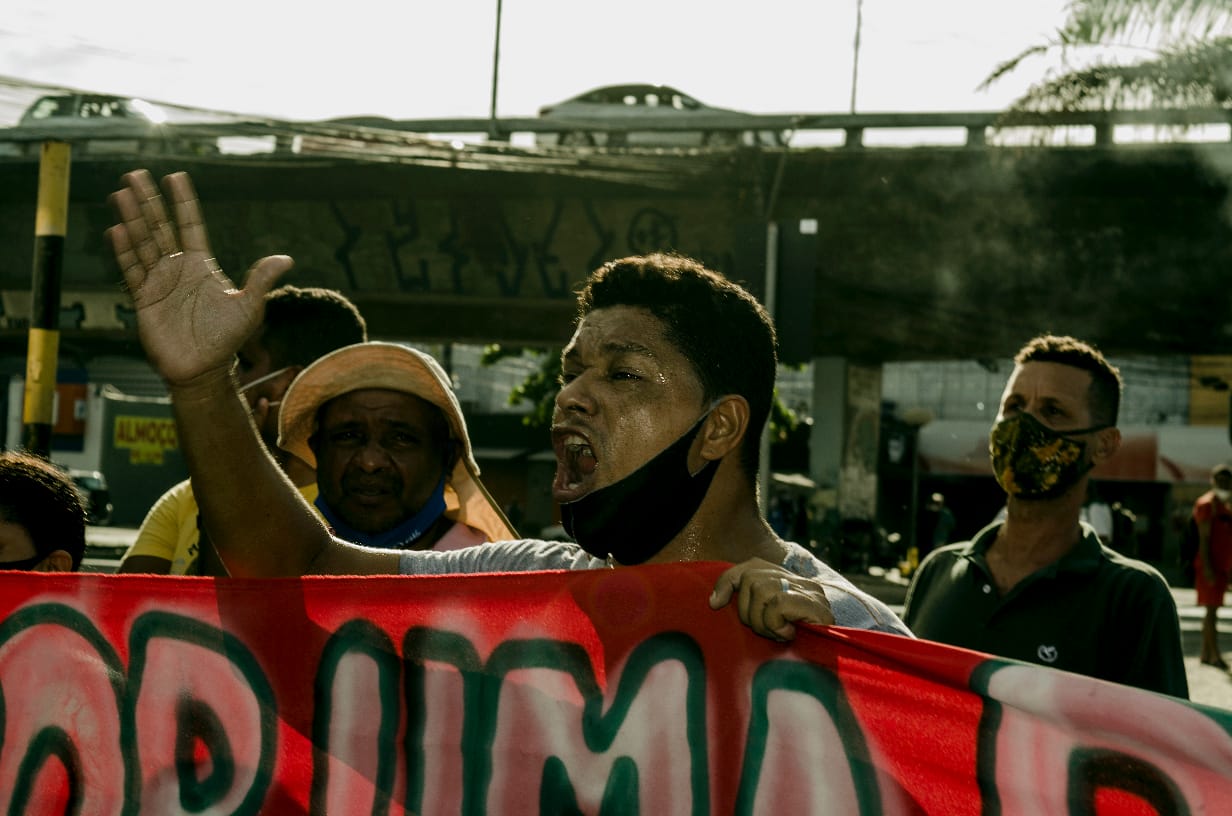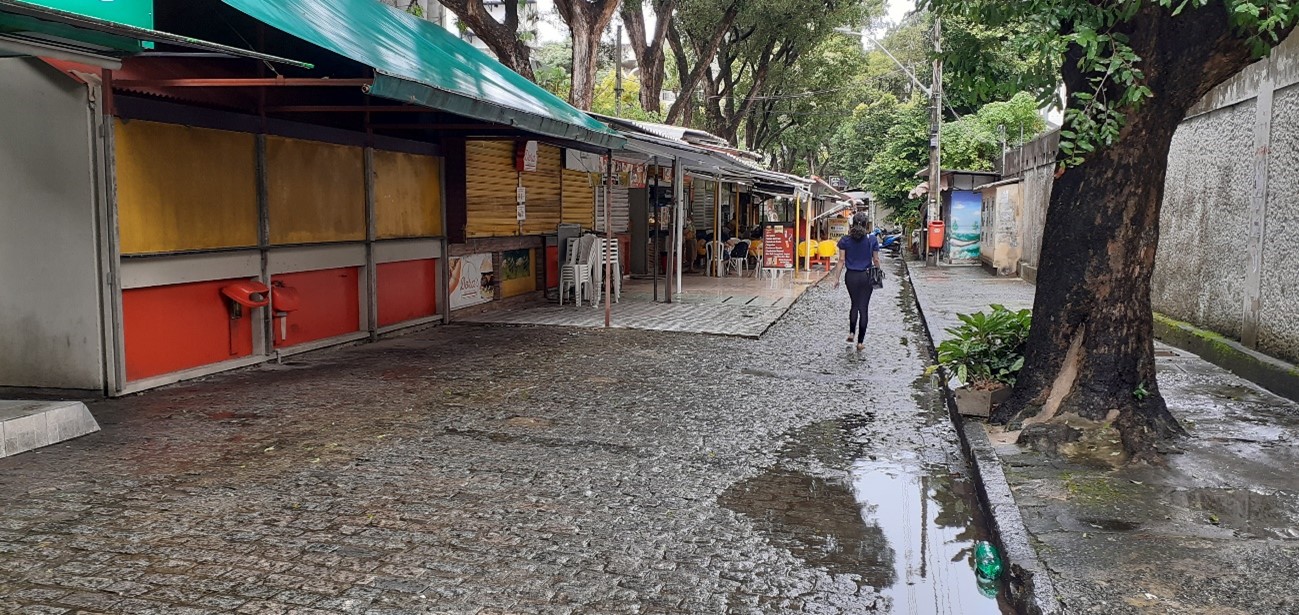The following article was written by our Youth Reporter on Ground João Lucas Gama of UNICAB (Brazil) and are part of our campaign to celebrate International Day of Street Vendors 2021.
“My paternal grandmother was a street vendor in the center of Recife” remembers Robson Galdino, also known as Robinho “and so was my uncle! My aunt went from selling natural sandwiches in the Boa Viagem beach to selling coffee within SEASA”. In 2006, after leaving her job as a photocopier in the Public Library fo the Pernambuco State and with the money he had earned from unemployment subsidy, Robson decided to follow the family tradition and set up the first snack stand in front of the house where he grew up, in the neighborhood of Várzea (west side of the capital of Pernambuco). At the time, he was 23 years old.
His business was at the end of a street without exit or pavement, which

seemed forgotten by the municipality. A year after Robinho set up his stand, the public admnistration remembered the existence of the street in which he had lived most of his life. They did not provide any infrastructure or listen to what the residents had to say about the problems of the street. Instead, they decided that a work equipment in that place was bothersome for the movement of people and the extremely low movements of vehicles.
After several harassment episodes by municipal agents, he decided to change the address of his workplace and took the stand to the sidewalk of the Federal University of Pernambuco (UFPE) where, along with his wife and an ex-co-worker who had received part of his indemnity in xerox machines, open a photocopying business. There, he was just one more among many other infrmal straders that surround the sidewalks of the 149 acres campus. “I never received any notification by being on the Federal sidewalk, in the sector in which I work” comments Robinh “The university has four main roads: BR-101 (a federal road), the Avenue Arthur de Sá, the street Acadêmico Hélio Ramos and the Avenue Professor Luiz Freire.
With the high demand of professors and students, the business was prospering and soon Robon was able to continue on his own. After just three months, he closed the society and bought on credit a machine of his own. However, the apparent tranquility in being able to work would not last for long.
In 2009, the Mayor of Recife, João da Costa (elected by the Workers’ Party) began a witch hunt against street trading in the city. Two years later, the systematic eviction of stands, kiosks and boards arrived to the neighborhood o Várzea, where UFPE is located as well as the people who live of it. Naturally, it did not take long for the threat to reach the sidewalk of the campus.
It was in 2011 that, as Brazilians say “o caldo engrossou”. The Mayor notified dozens of people and gave a deadline of 15 days for the voluntary exit for dozens of workers from the sidewalk of BR-101. “We were already seeing that several people were being notified in the neighborhood and we started organizing”, says Robinho.
It was through a friend and also an informal trader at UFPE named Ivonaldo Marcos (known as Belloto) that Robinho and other local vendors met Severino Souto Alves, who helped them create the Association of Barraqueiros of UFPE, an entity that was born as a response to “sanitation” promoted by João da Costa – which even went against the management of the two previous administrations of his party.
But the action of the public authorities came even before the Association was formalized. “One fine day, we woke up in the morning and the traders were all upset, because there was an operation there, with the Federal Highway Police, the Military Police of Pernambuco, Recife Municipality… an apparatus of police officers and Municipality cars to remove the informal trade at the Hospital das Clinicas [UFPE]”, Robson recalls with dismay.
The creation of the association was still underway, but a commission of approximately 15 to 20 people was set up to go to the site in an attempt to dialogue and, if necessary, resist the removal of the stands; among them were Robinho and Belloto.
There was no agreement, but an order to open fire on workers, mostly women and the elderly. “The riot police came forward, threw gas canisters and fired rubber shots – I was shot five times in that police action.” The tents were removed. The workers blocked the traffic and the police intensified the action. Reporters and press vehicles were sent to the scene, with live coverage from the main local television network; however, nothing prevented the men in uniforms from undertaking highly violent tactics against those who resisted in the hope of another day of subsistence.
That day, shots echoed at the doors of one of the main universities in Brazil. It cannot even be said that it was a day of war, as there cannot be war between marginalized individuals and those persecuted by armed bodies trained in warfare. What took part at the time was a massacre.
“Everyone was very ill, physically and psychologically injured”, comments Robinho, without going into great detail. These details were unimportant, because in the images that have survived the 10 years since then, it is possible to hear the sounds of shots and explosions accompanied by the noise of the propellers of a Federal Highway Police helicopter flying over the chaos ready to feed it with more bombs; you could see the smoke from burning tires and garbage bags (which formed barricades between workers and police) and the scattered fog of pepper gas was so frequent you could almost feel the acid burning your eyes, nostrils, and throat.
After what happened, Robinho, Belloto and the others concluded that it was urgent to formalize the Association of Barraqueiros of UFPE, so that it could be constituted as an instrument of struggle for street vendors in the region. They then sought out every vendor from around the campus, summoning everyone to attend the extraordinary meeting where the organization’s creation was completed, electing Belloto as its first president and Robinho as vice-president.
Once that was done, it was time for people to mobilize; with Severino’s help and guidance, the organization gained legal support and began to have greater political activity, seeking assistance from councilors and social defense institutions. They held an act on the outskirts of the campus, also mobilizing the student body (which was extremely dependent on local businesses) denouncing what was being done to the merchants.

“We went after ensuring the right to work, which is a constitutional right”, says Robinho, referring to article 6 of the Constitution of the Federative Republic of Brazil, which states: Education, health, food, work, housing, transport, leisure, security, welfare are social rights social protection, maternity and childhood protection, assistance to the destitute, in the form of this Constitution. “It was based on the Constitution that we sought and managed to pull a public hearing with all public agencies that were involved in the violent action that preceded the hearing”, he continues, “in this process, we reached an agreement to put the stands back in a mobile format”.
At that time, not only was Robson the street vendor born, but also Robson the militant and social leader. “That was when I discovered a reality that was seen but not felt; what my grandmother and uncle suffered as street vendors in the center of Recife ”, he says with emotion. “All the persecutions of the municipality started to impact me and became a reality in my life; I was a young man, I hada first job (where I spent around 3 years) and, in a situation of unemployment and after some things went wrong, I ended up resorting to street vending and being pursued by the municipal government ; I had to move and there I found other people in the same situation as me. ”.
After the creation of the Association of Barraqueiros of UFPE, Robinho, Belloto and the others began to export that form of collective organization to other parts of the city, where street commerce had a greater incidence. “One thing was very clear to me: the situation of the street vendor around the world. I began to see that that persecution was not something isolated, but that it was the persecution of a whole category of workers in the world; it is the attempt to end the right to work of this entire category and this is what happens every day”. The associations were proving successful and revealing new popular leaderships among merchants.
These leaders later joined together to create the Recife Trade Union of Workers of Informal Trader, or SINTRACI – which started to organize these workers in response to the persecution suffered and establish negotiation platforms with the public administrations, asking for just one thing: the possibility to discuss the city planning so that it supports informal trade, presenting viable alternatives, such as the registration of street vendors, street vendors, stall-holders and street vendors; besides the standardization of equipment and the development of laws that regulate street commerce – guaranteeing the possibility of work instead of persecution promoted by the authorities.
“Street vending has brought me not only the possibility of exercising my right to work with what I like, what I want and what I am able to do, but added to that, there are also all the difficulties in being a street vendor in a country where there are no public policies for this; then you realize that you have to fight to have what is enshrined in the constitution as a right. You need to fight for rights that are already guaranteed. ”. Recalling his history, he concludes that “the hardship of being a Brazilian, of being poor, led me to be a street vendor and the hardship of being a street vendor in a country that does not give you conditions led me to be an activist.”
In his assessment, informal trade is the fastest growing category in Brazil and in the world, due to the very neoliberal and austerity policies that governments have undertaken over the last three decades, which resulted in the growth of poverty and the deepening of inequality, especially in non-rich countries. In this context, the most impacted are people who experience greater degrees of social vulnerability; for these, all that remains is survival through informality. “Informal trade is pursued precisely because there is a growth in this demand and this demand is beginning to bring another vision to workers: the ability to self-manage. ”.
“This is a fight that is far from over, right? If we let them close the door to informal trade, for the power there will only be left an iron ball and a whip”, he concludes.

